Category — camino
The coming of the light
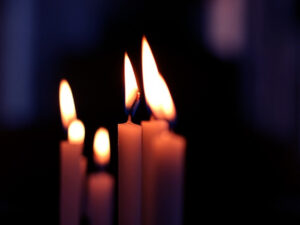
Almost every morning I walked in the dark, my head lamp illuminating the way ahead, but just barely. In Spain, even as early as late September when I started the 500-mile Camino Francés, dawn came later than I was used to. By the third week of October, as I was nearing the end, the sky didn’t lighten until close to 9 am.* And I was walking west, facing the darkest edge of the sky.
I am unaccustomed to walking without fear in the dark. What woman walks without fear in the dark? Some inky mornings I would walk for an uncomfortable distance without seeing the familiar waymarker, that bright yellow arrow announcing I was headed the right way. Some mornings, walking out of small villages into the black pre-dawn, I would see up ahead a dim light, the head lamp of a pilgrim in front of me. That sense of being alone but not alone was one of the core experiences of this journey. To be both solitary and connected, self-sufficient yet dependent. It’s hard to recapture that now, yet it was my everyday life then.
Occasionally, especially navigating through city streets I would get lost. Getting out of Burgos, I was spectacularly lost. I was without cell service, without maps, both a terrifying and a liberating experience. When I finally did come upon an embedded shell-marker in the pavement, my relief was so overpowering I believe I may have cried.
Sometimes I was so intent on looking ahead into the darkness, of navigating the uncertainty, of needing reassurance that I was on the right path, I forgot that the dawn was happening behind me. And then I turned, and there it was: a soft gray flannel rim to the sky, or lemon yellow streaks, or once the pale blue and pink of a baby’s room. And boom. If that is not a life lesson, my friends, I don’t know what the hell is.
It took some time to learn to embrace these mornings. But after a while, the pre-dawn hours were the most glorious, empowering moments of the long day.
I write about this today, Winter Solstice, the latest dawn, the longest night, reminding myself, reminding us all, about the coming of the light.
*Spain’s clocks have been set to Central European time since World War II, which means the sun rises considerably later compared to countries in its region.
December 21, 2022 No Comments
We don’t meet anyone by chance*
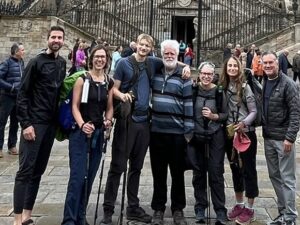
Harry. “Harry, like the Prince,” he says to me, introducing himself, “Harry, like Potter.” Harry is a 23-year-old from London, fresh out of university and an expert in everything, from literature to philosophy to finance. He lectures me on Aristotle and the existence of alternative realities, on the proper footware for the Camino. I can’t wait to lose him along the way.
Joan. She walks slowly and encourages you to walk ahead. She will catch up at the next village, she says. And she does, always. She is 79, bird-like in body with eyes that dart everywhere and take in everything. At dinner one night, a raucous pilgrim meal in an impossibly crowded room, she asks for a second bottle of wine, even though our little table hasn’t polished off the first. And she gets up and takes the bottle over to a table with four South Korean girls we all know from the trail, and she pours them each a glass. And then takes the bottle over to the next table where three guys, Italians, sit. One gets up and hugs her. Another smiles, slyly, “You want to get us drunk and take advantage of us, don’t you?” he says.
Alexander. He injured a tendon and has been sidelined for a week in a tiny village inhabited by more goats than people, an outpost with one church, one restaurant, one bar. Every day he borrows a guitar from the guy who owns the bar, sits in the sun and plays. He asks me what I’d like to hear. I tell him Dylan. He sings it in French. I think: I could stay here for a while.
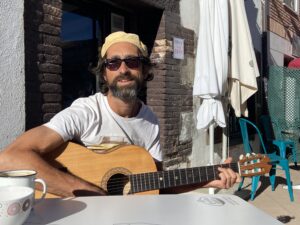
Maria, from the Netherlands, who carries her demons with her. Yevgeny, the son of Russian Jews who fled to Israel. Michael from Derry who has his first of a half-dozen beers at 10 in the morning. Emily, quiet and sweet. Jo, who never seems to have a down day. Andre, a young man in search of himself. Hans, from Norway, the big tough guy who calls his 6-year-old daughter every night.
On the Camino, enmeshed in the intimacy of that fluid community, you learn a lot about people. I don’t mean the facts of their lives, although there is that. I mean what kind of people they are: humble or vain, talkers or listeners, people who observe, who are curious and struck by wonder. Or not. People who think you are interested in seeing the x-rays of their bunion surgery that they happen to have saved on their iphone. People who tell you they went to the same middle school as Joan Didion and assume, oh-so-correctly, that this will forge a bond. People with a sense of humor, with a sense of purpose, with no sense at all.
*Avijeet Das, a poet and a writer from New Delhi, India.
December 14, 2022 4 Comments
Everything changes
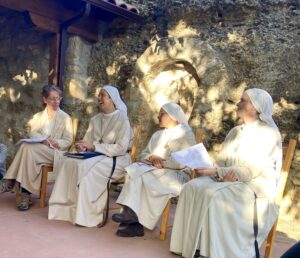
“Because I still matter,” one older woman said.
“Because I need to figure out what matters,” said a young man.
“Because I need time to think.”
“Because I think too much.”
There were maybe 30 of us pilgrims sitting on wooden chairs, crowded together in the little interior courtyard of the Iglesia de Santa Maria in Carrión. It was the late afternoon of my sixteenth day walking the Camino Francés. One of the four Augustinian nuns who would be leading us in song had asked us to say why we were on this journey.
“I need to do something to separate the life I’ve been living from the life that is now in front of me,” is what I said. “It needed to be something big.” There are so many moments on the Camino that grab hold of you, that surprise you, that sandblast you. This was one of those moments: Saying those words aloud, admitting the enormity of this transition, the blank canvas of the future. Being in the presence—and oh man, was it a presence– of these nuns, one of whom was so beatific that it was easy to imagine she had been touched by God. Even if you didn’t believe there was a God. Sitting in the fading sun with people from around the world, people you didn’t know but in that moment you knew intimately. Turning my head to see Kiki, our white hot friendship still in its early days, crying as we sang “Amazing Grace.”
And then the final song, the refrain of which went like this:
Todo cambió todo. Everything changes everything.
The song was lovely. But as I sang the words, I thought yeah, sure, I know this. Change is the only constant. The times they are a’ changin’. To exist is to change. Yep, got it.
But then I walked some more, a lot more, and a lot more after that. And I got home and slept in my own bed and made my solo dinners and stood here in front of this computer and did what I do. Then one afternoon I ventured out for coffee. Todo cambió todo.
“When you come out of the storm,
you won’t be the same person who walked in.
That’s what this storm’s all about.” ― Haruki Murakami
December 7, 2022 9 Comments
A landscape of kindness

“Choose to be kind” proclaim the wooden signs stuck in the lawns of every other front yard in my town.
I think about this a lot, about how performative “activism” (words, signs, t-shirts, bumperstickers) too often takes the place of real action, how they, in fact, excuse lack of action.
I thought about kindness a lot when I walked the Camino. Or rather, I didn’t think about it as much as I felt immersed in it, as much as I felt I was part of this landscape of kindness. One very hot afternoon, my favorite walking companion (and sister-from-another-mother) Kiki and I were trudging into yet another tiny village, Hornillos de Camino, on what was probably a 26 or 27 kilometer day. We were sweaty, dehydrated and cranky. We ventured into a mercado the size of a walk-in closet, each bought an icy-cold Kaz Lemón, and hunkered down on a log outside the store, sitting in the blazing sun. A minute later, the owner of the store appeared with an apple in each hand. “Manzanas cultivar en un huerto local,” he said, smiling and handing us the fruit. Then he insisted we move into the shade on a bench near his little store. That’s it. That’s not a lawn sign. That’s the real deal.
Another day, walking in the late morning with a soft-spoken Australian woman named Emily, we found ourselves winding down the steep cobblestone streets of a small village. I think it was Zuriain. It had been raining, misting really, and the stones were slick. We turned a corner and saw a small group gathered around a man sitting on the ground. When we got closer, we saw that his forehead was bleeding, and he had a gash across his nose. His left leg was outstretched, elevated on a pack. The ankle was wrapped. His toes were swollen and blue. He had slipped and fallen a few minutes before.
Brian, a nurse from Colorado whom I had met and walked with briefly the day before, had wrapped the ankle. Others walked with first-aid kits. He walked with a medical kit. Another pilgrim whose phone had a Spanish sim card had called an ambulance. It would take a while to get here. A third was speaking to the man’s wife in the Netherlands. Emily and I stood there for a moment. Then she walked over to his side, kneeled and took his hand. Just held his hand.
As I write this, I am reliving the moment. I am again part of this landscape of kindness: The rain starting in earnest; the small group gathered; the man, a stranger to all, in the center. And Emily, wordless, holding his hand.
Just fall into that for a moment, my friends.

November 30, 2022 4 Comments
Everything weighs something
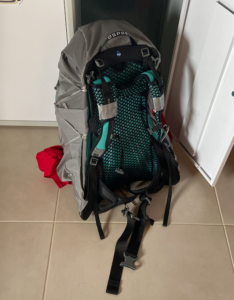
It didn’t occur to me until the fourth day of walking the Camino when my (ever-so-carefully-chosen) super-lightweight backpack with its (ever-so-carefully-chosen) super-lightweight contents started to cause a deep bone ache in my left shoulder blade. I was unpleasantly—painfully—surprised. I had spent a lot of time thinking about and researching what to take on this 500-mile journey. I paid strict attention to grams and ounces, choosing a rain jacket I didn’t really like that much over one I did because it weighed two ounces less. I bought an ultra-light sleeping bag that closed with little plastic snaps rather than a weighty (as in 3.5 oz.) zipper.
I was relentless, obsessive. I parceled out three band-aids for my first aid kit instead of including a small box. I cut my toothbrush in half. Oh yes I did. Every individual item I chose to put in that backpack–everything I firmly believed (or was told on countless helpful websites) I would need for the journey—I chose by weight.
But…everything weights something. And all those somethings add up. All those somethings, together, were a big something. This came as an ah-ha moment four days in. It doesn’t sound like much of a revelation. But it felt like one to me as I wrapped the shoulder strap of my backpack in the moleskin I was carrying to treat the blisters I never got.
One of the things about walking every day for fifteen, eighteen, occasionally twenty miles—and then getting up and doing it again, and again, for 36 days—is that the monotony of the physical act frees you to think big thoughts. (Or sometimes no thoughts at all. )
And so, when “everything weighs something” popped into my head, I began to think big thoughts, like: Okay, this is not just about the damned backpack. It is about life. About the weight we carry. All those little somethings.
Sure, we are aware of the burden when something big happens: disease, death, divorce. That is heavy luggage. But we are often unaware of the collective weight of the many little things. That thing we should have said but didn’t. That thing we said but shouldn’t have. That misunderstanding that was never cleared up. That time someone disappointed us. That time we disappointed someone. That time we needed a little help and didn’t get it. That time we needed a little help and didn’t ask for it. That look. Oh, that look. The little slings and arrows. We stuff them away.
But they add up. And then, one day, we feel the weight.
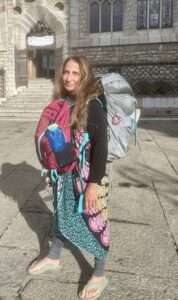
November 23, 2022 6 Comments
Signs along the way
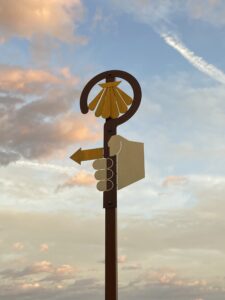
As you are going along The Way (and by The Way, I mean The Way of St. James, the Camino de Santiago), you see signs. Some are obvious. They boldly announce that you are on the right path. Or they unmistakably point you in the direction you need to take.
On the Camino these can be big, brilliant yellow arrows, or turquoise blue signs with canary yellow clamshells, or concrete waymarkers with kilometer counts. Sometimes these signs are eye-level and hard to miss. Sometimes they are painted on the sides of barns or fences or stone walls, faded, barely visible. Sometimes they are little plaques embedded in the road, easy to miss unless you are looking down.
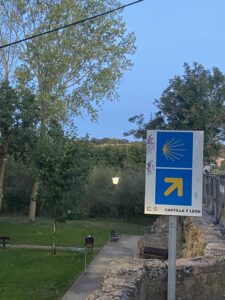
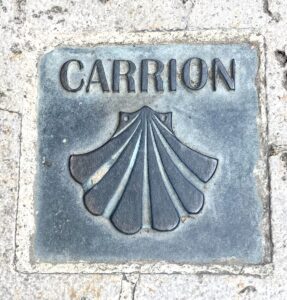 Sometimes, especially in Galicia, these signs greet you so often that you stop seeing them. Other times you can go a long way without seeing a sign, and you are concerned that you have lost the way, and just as that concern is about to turn to worry or even into something darker, you see a sign. The relief borders on exaltation.
Sometimes, especially in Galicia, these signs greet you so often that you stop seeing them. Other times you can go a long way without seeing a sign, and you are concerned that you have lost the way, and just as that concern is about to turn to worry or even into something darker, you see a sign. The relief borders on exaltation.
And then there are the times you see no sign at all, but you see a person walking way ahead on the road, or you see the light of their head lamp. Although you may never catch up, never know who this person is, you feel gratitude and friendship. This happened to me along the Camino a number of times when I started alone in the pre-dawn hours. It brought to mind that E.L. Doctorow quote I am so fond of that I have used it in just about every talk I’ve ever given about the process of writing: “Writing is like driving at night in the fog. You can only see as far as your headlights, but you can make the whole trip that way.”
And that, really, is how I made my way: from sign to sign, by the light of my head lamp, by the distant light of someone else’s. Seeing just what needed to be seen to take the next step.
Now two weeks home, I am thinking: I wish life was like the Camino and every so often, just when you needed it, there was a sign to tell you, to reassure you, that you were on the right path. And then I think: Maybe life is like this, but we don’t know what the signs are, or we ignore the signs, or we are just looking elsewhere.
November 16, 2022 15 Comments





